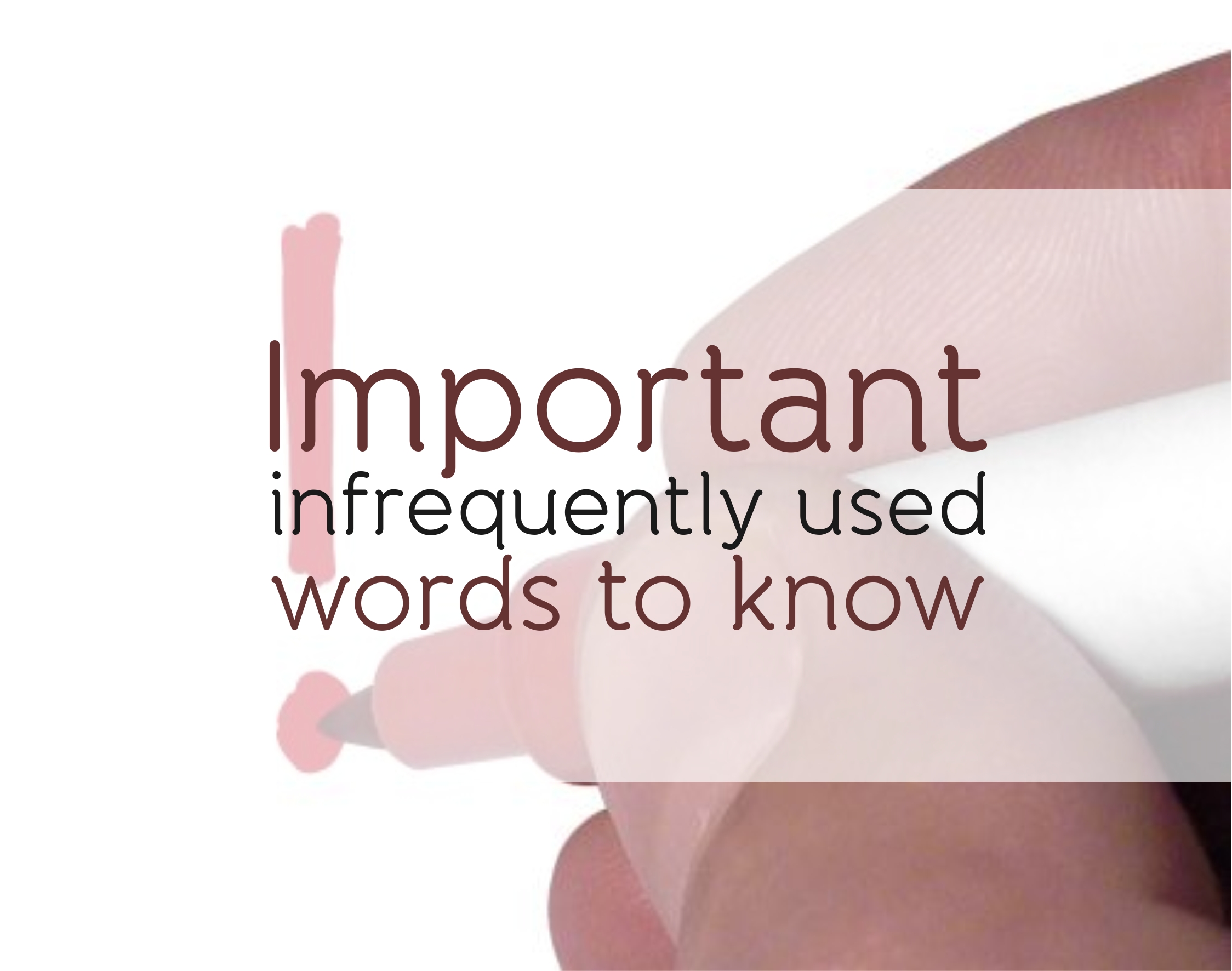These 9 Words Don’t Mean What You Think They Mean

The following is an excerpt from The Curmudgeon’s Guide to Getting Ahead, in which author Charles Murray discusses words with meanings that have changed — and not always for the better.
1. Disinterested
Disinterested used to mean uninterested.
The meaning of disinterested is “free of bias and self-interest.” It is essential that a judge be disinterested, for example. Disinterested does NOT, repeat NOT, mean “lack of interest” or “uninterested.” I put this so emphatically because we’re not talking just about proper usage. Disinterest used in its correct sense is on its last legs—I’ve been appalled to see it misused in articles in the Washington Post and other major publications. English does not have another word that conveys the meaning of disinterested as economically. If we lose the distinctive meaning of the word, we have measurably degraded our ability to express ourselves in English.
2. Literally
Literally used to mean figuratively.
The percentage of times that literally is used correctly verges on zero. Ninety-nine percent of the time (I’m estimating), it is misused to mean figuratively. In almost all of the other one percent, literally is used as a sloppy intensifier. The only correct use of literally that comes to mind is the sign-off of George Burns and Gracie Allen, former vaudevillians who had a television sitcom in the 1950s. She played the role of a ditz. At the end of the show, George would say, “Say good night, Gracie,” and she would say, “Good night, Gracie.” She took George’s instruction literally. Such opportunities to use literally correctly don’t come up often.
3. Fortuitous
Fortuitous used to mean fortunate or serendipitous.
Fortuitous means happening by accident or chance. It has no good (or bad) connotations. Serendipitous means the faculty of making fortunate discoveries by accident. So Alexander Fleming’s discovery of penicillin because he mistakenly left a petri dish open overnight was both fortuitous and serendipitous.
4. Dilemma
Dilemma used to mean difficult decision.
Not all difficult decisions are dilemmas. A dilemma (from the Greek word meaning “double proposition”) refers to a situation in which a choice must be made between two undesirable alternatives.
5. Masterful
Masterful used to mean masterly.
When people use masterful, they almost always really mean masterly: performing in an extremely skillful and accomplished way. As in the case of disinterested, we are in danger of losing a useful word for which we have no ready alternative. If you want to describe someone who exhibits the qualities of a person who is confidently and effectively in authority, with connotations of power and dominance, masterful is the perfect word. Use masterly when you want to compliment someone for exhibiting a high level of skill.
6. Problematic
Problematic used to mean “I have a problem with this.”
Something is problematic if it is difficult to resolve or if it presents an objective problem that needs to be resolved. It doesn’t mean that you personally have an objection to something. For example, it is appropriate to say that a proposed voter ID bill is problematic because it risks disenfranchising more eligible voters than it prevents fraudulent votes, but not to say that it is problematic because it is racist and offensive. That may be your sincere opinion, but people on the other side can be just as sincerely convinced that it is not racist and offensive and neither side can prove the other wrong. I should add that I’ve been guilty of this misuse of problematic. It’s a seductively attractive way to introduce a personal opinion without having to take responsibility for it.
7. Begs the question
Begs the question used to mean raises the question, evades the question, or makes you wonder.
To beg the question means to assume as true the thing that you are trying to prove—to make an unsupported claim with circular reasoning. The tip-off is that a person who has begged the question has in effect repeated himself. A classic example used to illustrate begging the question is “Opium induces sleep because it has a soporific quality.” Like literally, beg the question is almost never used correctly. It usually would be more accurate to say that someone has raised the question, evaded the question, or made you wonder about something.
8. Notorious
Notorious used to mean famous.
Notorious means famous in a bad way. Never use notorious to describe someone who is famous for acceptable reasons. Lance Armstrong was a famous bicyclist who became notorious for his lies about doping. While I’m on the subject: Notorious is not as evil or horrible as infamous. Armstrong is notorious. Hitler, Mao, and Stalin were infamous.
9. Decimate
Decimate used to mean destroy or inflict great damage.
You don’t need to worry about this one unless you’re dealing with someone who is not only a curmudgeon but even more pedantic than I am. The primary meaning of decimate is now indeed destroy or inflict great damage. But it originated in Roman times and referred to a punishment in which a tenth of the members of an army unit were executed. Once you’re aware of that, it’s hard to read someone’s use of decimate to mean destroy without remembering that it really means destruction of only a tenth of the whole.
SOURCE
Image courtesy: http://kuwaitiful.com
Read on:
14 responses to “These 9 Words Don’t Mean What You Think They Mean”
Trackbacks / Pingbacks
- - April 14, 2014
- - April 18, 2014
- - May 31, 2014

























“used to” used as “used as”. Pretty soon we won’t be able to say “Proper english used to be fun”!
I think you are righteous to attempt to inform the English speaking people of the epidemic misuse of their native tongue. However, I also believe it will generally fall upon deaf (blind?) ears (eyes? – you know what I mean), as most of the abusers of grammar and such are not moved by their own blatant hypocrisy nor ashamed of the stinky tackiness and ignorance they practically wear like a pretty corsage. Not trying to be negative, but this has been my observation. I only wrote to commend your efforts, and also 2 other things I could not keep to myself: You mentioned at the end of the “begs the question” section something as to it being akin to “evaded the question”, but “evaded” means to avoid or escape, which is not what the rest of that sentence is pointing to, so you may wish to edit that one out. OH! And, though you may or may not believe me, I use literally, properly, all the time, for I am a rare breed who tells of any given situation or experience as it really was and is pretty damn literal most all of the time. You are correct, far as I can tell, though to say most everyone ELSE has no concept of what that is, even, and literally don’t even believe in the ability of a human being to speak such. I think that made sense at the end there. And I hope I do not sound like a jerk. I relate to your voice here and it is hard for me to find that kind of similarity in people. 🙂 Good job (and p.s., I only point out the “evaded” thing because I would have wanted to know and be hellbent on removing it if it were my own writing, I really am not neener-neenering like some stupid smear between know-it-all kids, so hopefully I did not express it that way.) Keep writing and great job!
Have a great day!
A quick heads up: decimate means reducing the number to a third, not kill a tenth of the bigger number. Yes, I am more pedantic than you are 😉
No, that is not correct, Ben.
Decimate does really mean “remove a tenth”.
This should not be surprising, as “deci” is the commonly used latin prefix for the number 10.
I cannot understand how you believe decimate to have anything to do with thirds…
PS: The Romans also sometimes punished soldiers by removing one in twenty (vicesimatio) and one in a hundred (centesimatio).
Disinterested never meant uninterested. It always meant unbiased. Problematic is problematic because it used to mean nothing and not exist. Problematic is a neologism that arose from the need for a passive sentence structure to absolve the speaker from blame. I do not recall it being used before the Reagan administration.
Whilst you are no doubt correct in the original meanings of the words listed, you are otherwise utterly wrong. The meaning of words is defined by their useage, not origin. If decimate has now come to mean destroy, then that is what it means. No amount of moaning by purists can, or will, change that.
That may be true if you are Humpty Dumpty speaking to Alice, but in the real world words have intrinsic meanings
Nope they don’t because words do not exist independent of human beings. The only meaning words have (=visual or auditory patterns) are the meanings people give them. Without people words have no meaning. Imagine an alien coming to our planet and find a book. It will have no meaning to them whatsoever because.. words have no intrinsic meaning. Without someone giving a word a meaning they are either just meaningless sounds or meaningless visual patterns. Therefore they do not have ANY intrinsic meaning… whatsoever.
You are correct, I should have stated that words have an intrinsic meaning within a certain language. Nonetheless, the concept that a word means what I intend it to mean is very reminiscent of Humpty Dumpty lecturing Alice.
<> This is (obviously) a pretty long and somewhat philosophical post, as what lies at the core of our disagreement is no simple matter in my opinion. If you aren’t interested in discussing this I do understand (although I would be a bit disappointed haha). This type of discourse is just not for everybody. There is a kind of summary / TL;DR section towards the end, but even that is still quite long.
Also, let me just say that I am no expert on Language and especially not how Language came to be (I’m a cognitive psychologist/neuroscientis). Although I do have some of my own theories on the origins of language, know a few things about the philosophy of language, and about how language is processed by the brain.
Personally I love philosophy – as a hobby which is why I would actually write a wall of text like this in the first place knowing there is a high chance nobody is going to read it). However, I certainly do not want to claim that my view is the ‘ultimate truth’. I am always open to crticism and prepared to change my views. That being said, let’s begin with this monster of a post.
I can agree to what you’re saying to an extent then, but only in so far that words do indeed have meaning within a certain language, culture or even species. However, even within the context of a language the words do not have an intrinsic meaning in my opinion. This might simply be a matter of semantics, however, and tends to go in the direction of a philosophical debate as to when one can say that something has an intrinsic property X. Personally I am actually quite an extremist in this regard and argue that absolutely nothing (or almost nothing) has intrinsic meaning. Meaning is a human construct – it exists only in the human mind. Reality is not made up of “meaningful” events or things. It is made up purely of patters of energy that become visible to our senses through the different modalities, namely sight, hearing, touch, smell and taste and it is us humans who give these sensory experiences meaning. We humans just happen to be extremely good at pattern recognition, which most likely is one of the main reasons we possess language capabilities at all (at such a high level).
Sorry to put it so blatantly, but to say that a word has intrinsic meaning even taking the ‘within the context of a language” part into account is in my opinion incorrect. Yes the words have meaning within the language but it is not an intrinsic meaning of the word, the meaning was given to the word by the human mind. I think there are only very few (if any!) ‘events’ in reality that have intrinsic meaning, in the sense that it has meaning that emanates from the ‘event’ itself without any need for an observer to attribute a meaning to the ‘event’ themselves in order to understand its meaning (NB: ‘event’ just serves as a place holder for ‘everything in reality’: objects, activities, feelings, etc etc and in this case words).
There are several arguments to support that words (and anything and everything else for that matter) don’t have intrinsic meanings using the definition of intrinsic meaning described above. Whether the word is presented within a context of a language that gives the word meaning or completely independent of a language does not matter (even whether the language was constructed by humans or other beings does not matter, in each case the meaning of a word is attributed to the word by these beings / by pattern recognition ‘systems’). The point is that a word’s meaning is provided by humans, and kept somewhat intact by the ‘structure’/entity (for lack of a better word..) of language itself which in turn only exists as a human construct, though. You see, no matter how you twist it, a word’s meaning is given, and not intrinsic to the word, even in the context of a language.
To further explain and support this view, two imaginary scenarios might help to understand this view. Both seem like completely different arguments but the logic behind them is almost identical.
First, imagine being a newborn child once more. The world around you makes no sense whatsoever. Part of the reason why (most of us) can’t remember the first few years of our lives is likely due to the brain regions involved in speech production and comprehension haven’t fully developed yet (although pattern recognition areas would be a more suitable name for these areas), or at least not to a point at which we are able to make sense of the world around us, that is to attribute meaning to our surroundings. Without the ability to attribute meaning to events happening around us there is no way to make sense of the world, and therefore nothing remains that can be remembered. In order to be able to remember something one has to be able to recognize the thing you want to remember as “something”. No matter what that something might be as long as you can distinguish it from other patterns of input/information/sensations. But instead as a newborn it’s just one big cascade of seemingly (or actually?) chaotic patterns. No wonder we don’t remember anything from childhood. It’s one big meaningless chaotic mess of sensory impressions which our brains cannot categorize into meaningful patterns of “something” yet due to an underdeveloped brain.
Aah, I got a bit derailed there, sorry.. My point, even a child doesn’t pick up on the intrinsic meaning of anything. And to no surprise really, because there simply isn’t any meaning other than the meanings we project onto these chaotic sensory impressions ourselves. Once the pattern recognition system is up to speed we begin to make sense of the world and learn to speak. We pick up on certain words / auditory patterns and associated them with certain situations and not others. Thus, to put it quite dramatically, meaning is born. Suddenly those random sounds your mom and dad were making have a meaning for the child. It learns the exact meaning of a word by using the same sound (=word) in similar situations as to where it encountered it in the first place. Consequently through trial and error the meaning of the sound gets more and more defined (e.g. in what kind of situation do I use this sound, what happens when I make this sound). Again, this is very strong evidence against the idea that words/sounds, or “patterns”, have any intrinsic meaning at all. Instead meaning is derived from the type of situations a word is used, what can be achieved with it, which in turn depends on how the people who taught you that word used it. What did it mean for them? That is what it is going to mean for the child as well. That is to say, at least initially, until a word starts to be used in other situations or to achieve other ‘results’ in our surroundings, at which point the meaning of a word might change for an individual. Whether or not the change in meaning stays at the individual level, or becomes a societal phenomenon simply depends on how many people use the words in the new situation or to produce different results. Language thus is not a set in stone system. It’s an ever dynamic updating of meaning attribution to words, based on past experiences (=where, when and how the word is used by other people, and what its effect actually is / how it is interpreted by our surrounding, by other people).
The second imaginary scenario involves going back even further in time and trying to imagine that you were one of the first of our ancestors that uttered sounds which carried meaning. Like I said I’m definitely no expert at how language come to be, so the following examples of meaningful sounds are just randomly chosen.
So let’s say you are one of those early ancestors and our ancestors brains have finally after many many years of evolution lead to – i don’t want to say a new area, but it expanded on the already existing pattern recognition system and allowed us to recognize sounds (sounds/as in speech are some of the most complex patterns to be able to recognize so it’s no surprise that its development in children is later on in the developmental process, and only comes/came to be after more basic processes of pattern recognition we’re already in place, both in an evolutionary sense and a developmental sense.So this new ability allowed us to recognize one sound as clearly different from another sound. At this point one has achieved creating “something” out of what before seemed like random chaotic patterns. Of course ‘something’ is in itself not very meaningful except in that it crates the possibility to differentiate between those sensory impressions that can be experienced as notably distinct, versus those that just seem a chaotic mess. It also implies that one ‘something’ (a certain sound e.g. “Ah”) is not the same as another ‘something’ (.e.g “Oh”) as you’re brain is now able to recognize the differences in auditory patterns between the two sounds. So what happens next I imagine is that we as ancestors started using these newly distinguishable features of reality. Now, both Oh and Ah are sounds that are pretty much produced naturally. They aren’t arbitrarily chosen combinations of sounds (as most modern words with meaning; yea I know it’s not completely arbitrary). Either way these sounds are more like exclamations, than words. However they still carried meaning because they probably occurred to different degrees in different situations (which is also why they might still have very similar meanings up to today – the situations in which these sounds are used haven’t changed much).
The short “Ah” sound might have become associated with a more positive connotation, with insight and understanding or perhaps, likely even, a much more generalized interpretation of such a sound as these are only the beginnings of language, namely that something is ‘good’, or ‘safe’. This would also provide evolutionary value to the usage and therefore the ability to identify it (to be clear “AAAAAH” as in screaming haha, although that would work as an example just as well and would likely be associated with something like fear or battle).
Conversely a short “Oh” sound might have occurred more regularly in situations of surprise. Later on perhaps it was further subdivided into both good and bad surprises, by consciously using a different intonation when saying “Oh”, unless the difference in the Oh sound in response to an unfortunate surprise vs a fortunate one is also a naturally occurring difference in sound in response tot he two situations, that wasn’t ‘invented’ by humans.
Independent of whether I actually used good examples here, whether these Ah and Oh sounds were indeed produced ‘involuntary’ in response to certain events in our surrounding, and whether they actually carried those meanings back then the point of the example is that there most certainly were sounds that humans produce involuntarily in certain situations. By being able to recognize and distinguish the sound from other sensory impressions and recognizing that it occurs (more often) in certain situations than others, we have attributed meaning to a sound – The first step in producing a language system.
At this point I would be prepared to give in to that perhaps such basic fundamental sounds such as Ah, AAAAH, Oh etc, might produce the illusion of intrinsic meaning (that is the meaning never changes, but still the meaning isn’t intrinsic to the sound), but only in so far that the sounds consistently occur in certain situations (and not others) across time and space. In the end it is still humans (or rather our ancestors in this case) who attributed the first meaning to a sound that formerly was an indistinguishable chaotic mess, something without meaning because their brains did not allow them to recognize them in enough detail to make sense of, or to be used in any practical manner. They applied meaning to something that is intrinsically meaningLESS because it offered higher chances of survival if one could indicate that a situation was safe/good vs unsafe/bad by simply uttering a sound. This could’ve even been an unconscious process in that some associated the sound event with the circumstances while others didn’t. The ones that didn’t had lower chances of survival, ergo they eventually went extinct.
<<>>
To sum up, both the newborn, and ancestors example argue that meaning is attributed by humans and that events/sensations do not posses any intrinsic meaning. Meaning is derived from a series of pattern recognition processes. First being able to identify a pattern (a certain sound, smell, touch, taste, vision). Second being able to identify patterns in occurrence of those distinguishable patterns. Meaning, at it’s core, is thus simply saying sensation X happens under circumstance Y. That is how language and meaningfulness of surrounding events in my opinion came into existence. Of course language has grown much more complex since our ancient ancestors uttered their first ‘words’. Nowadays the meaning of a sensation/event is even often confused with the word itself, as if a word equals meaning. It does not, the word, a sound just consistently co-occurs with certain circumstances. The meaning of the situation is a combination of both the sound and the circumstances under which the sound has a high chance of occurring. Put even more simply, meaning is derived from correlation between events. This “discussion” started with just the meaning of words, but really meaning is in this sense at its core automatically applied by the Brain to any co-occurrence of events, whether they be sensations of smell, taste, sight, hearing or touch, (or thought if you want to count it as a separate sense). Whenever two sensations co-occur a connection is ‘established’ in the brain between the two representations of those two events (can of course be and usually are more than 2 events). This neural connection then is the source of the meaning of that situation. As I just mentioned words are nowadays easily confused with meaning as such. Words however, do not give meaning to a situation, object, feeling, what have you. All they do is label it with (ironically) an intrinsically meaningless sound which we ourselves have applied a meaning to in the past / during our upbringing. It is certainly not surprising to confuse the two as the word is part of the meaning, it is part of the correlation between a sound and other events. Furthermore, the way we use language doesn’t help much in distinguishing the subtle difference either: e.g. sentences like “The meaning of this word is …..” reinforce the idea that words *are* the meaning of whatever they refer to. However, a word does not only have no meaning without a highly-developed pattern recognition system (e.g. humans) but also has no meaning in isolation from the thing it refers to. Imagine the word computer (a sound-event), without the existence of computers (a visual or cognitive/’thought’ event). The sound “computer” would be meaningless without the existence of the thing it refers to or co-occurs with (NB: by not existing I mean never has existed and none would know what you would mean if you uttered the ‘word’ computer; the actual computer would have no existence in either the physical or ‘cognitive’ realm). All meanings are the correlations/co-occurrences of events. It is these correlations (i.e. meanings) that we then label with a word. But the correlations/meanings are surely not equal to the word that labels it, just as a bottle or other object is not equal to the label you stick on top of it.
——–
Alright, I think that is enough philosophy of language for a comment section for now ;). If you read all of this: you have my respects (and I would certainly be interested in any criticism or counter-arguments haha). If not, then no worries, I understand 🙂
Best,
Dominique
I d really loved it it helped me a lot for the word power thank.
Lavanya Singh